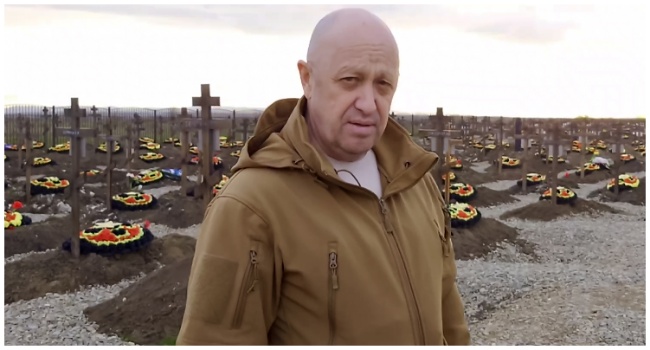Prigozhin was locked in a bitter months-long power struggle with the defence ministry as his ragtag forces spearheaded the costly battles for limited gains in eastern Ukraine.
Mercenary chief Yevgeny Prigozhin, who was feared dead Wednesday in a plane crash near Moscow, was a Kremlin confident catapulted to infamy by Russia’s offensive in Ukraine before he turned his troops on Russia’s capital.
Prigozhin’s order in June that his private fighting group march on Moscow to unseat Russia’s top brass presented the most serious challenge to President Vladimir Putin’s hold on power over more than two-decades.
His forces captured a key military headquarters in the city of Rostov-on-Don in southern Russian before setting their course for Moscow, where authorities beefed up security in anticipation of a showdown.
“The evil that the military leadership of the country brings must be stopped,” Prigozhin announced after claiming the defence ministry had launched strikes on Wagner bases.
But the failed bid ended with Putin ultimately offering exile in neighbouring Belarus to the mutineers and Prigozhin, who appeared in footage this week vowing to make Africa “freer” and suggested he was on the continent.
Before Putin, who accused Prigozhin of treason, ordered troops to Ukraine in February last year, the 62-year-old mercenary head dispatched fighters from his private force to conflicts in the Middle East and Africa but always denied involvement.
That changed last year when he announced himself as the founder of the Wagner group and began a mass recruitment drive at Russia’s prisons for foot soldiers to fight in exchange for an amnesty.
– Bitter top brass rivalry –
He gained public acclaim as Wagner spearheaded the capture of several key Ukrainian towns including Bakhmut. But Prigozhin began blasting what he said was systemic mismanagement and lying in the Russian defence ministry.
Prigozhin was locked in a bitter months-long power struggle with the defence ministry as his ragtag forces spearheaded the costly battles for limited gains in eastern Ukraine.
He had earlier accused the Russian military of trying to “steal” victories from Wagner and slammed Moscow’s “monstrous bureaucracy” for grinding progress on the ground.
And he directly blamed Russian Defence Minister Sergei Shoigu and other senior officials for his fighters’ deaths, claiming Moscow had not provided sufficient ammunition.
Unlike Russia’s generals, who have been criticised for shirking the battles, the stocky and bald Prigozhin regularly posed for pictures alongside mercenaries allegedly on the front lines.
He posted on social media images from the cockpit of a SU-24 fighter jet and challenged Ukrainian President Volodymyr Zelensky to an aerial duel.m
The former hotdog seller and native of Putin’s hometown Saint Petersburg, who was jailed for nearly a decade during the Soviet era, for years dismissed he was linked with Wagner.
But last September, he conceded that he had founded the fighting force and opened headquarters in Saint Petersburg.
A video surfaced of a man bearing a strong resemblance to Prigozhin in a prison courtyard, offering contracts to prisoners to fight in Ukraine with a chilling set of conditions.
– Shooting deserters –
“If you arrive in Ukraine and decide it’s not for you, we will regard it as desertion and will shoot you,” said the man.
When video footage circulated showing an alleged Wagner deserter being executed with a sledgehammer, Prigozhin praised the killing, calling the man featured in the video a “dog”.
Prigozhin rose from a modest background in Russia’s former imperial capital to become part of an inner circle close to Putin.
He spent nine years in prison in the final period of the USSR after being convicted of fraud and theft and, in the chaos of the 1990s, he began a moderately successful fast food company.
He fell into the restaurant sector and opened a luxury location in Saint Petersburg whose customers included Putin, then making the transition from working in the KGB to local politics.
The company he founded at one point worked for the Kremlin, earning Prigozhin the soubriquet of “Putin’s chef”.
Prigozhin has been described as a billionaire with a vast fortune built on state contracts, although the extent of his wealth is unknown.
One of the best-known images shows him at the Kremlin in 2011, bending down over a seated Putin and offering him a dish while the Russian leader looks back with an approving glance.
– The ‘troll factory’ –
He was sanctioned by Washington, which accused him of playing a role in meddling in the 2016 US presidential election, in particular through his internet “troll factory”.
Prigozhin at the time denied any involvement and in 2020 asked for $50 billion in compensation from the United States.
In July 2018, three journalists researching Wagner’s operations in the Central African Republic for an investigative media outlet were killed in an ambush.
Western countries have accused the private fighting group of coming to the aid of the military junta in Mali, in a move that contributed to France’s decision to end an almost decade-long military operation there.





































Excellent insights! Your breakdown of the topic is clear and concise. For further exploration, I recommend visiting: READ MORE. Keen to hear everyone’s opinions!